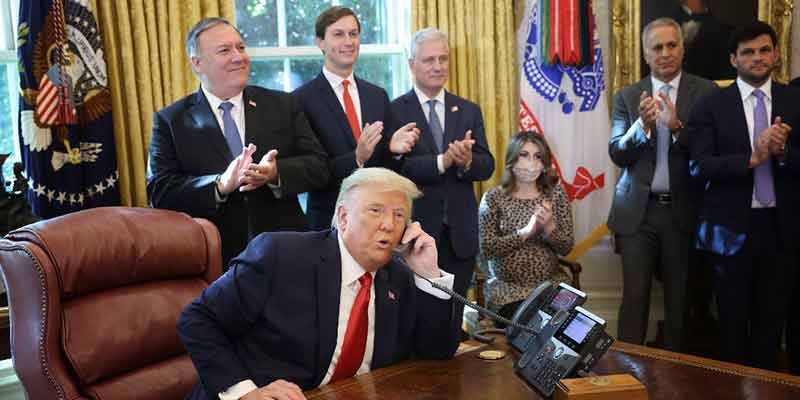- World
- Oct 25
Sudan agrees to normalise relations with Israel
Israel and Sudan agreed to take steps to normalise relations in a deal brokered with the help of the United States, making Khartoum the third Arab government to set aside hostilities with Israel in the last two months.
US President Donald Trump sealed the agreement in a phone call with Israeli Prime Minister Benjamin Netanyahu and Sudanese Prime Minister Abdalla Hamdok and Transitional Council Head Abdel Fattah al-Burhan.
It was foreign policy achievement for Trump just days before Election Day. Earlier, the Trump administration engineered diplomatic pacts between Israel and the United Arab Emirates and Bahrain — the first since Jordan recognised Israel in the 1990s and Egypt in the 1970s.
Trump said at least five other countries want to come into the deal, which is collectively called the Abraham Accords.
US removes Sudan from sponsors of terrorism list
Sudan is on a fragile path to democracy after a popular uprising last year led the military to overthrow the longtime autocrat, Omar al-Bashir. Thousands have protested in the country’s capital Khartoum and other regions in recent days over dire economic conditions.
Trump had announced his decision to remove Sudan from the US list of state sponsors of terrorism once it deposited $335 million it had pledged to pay in compensation. Khartoum has since placed the funds in a special escrow account for victims of al-Qaida attacks on US embassies in Kenya and Tanzania in 1998.
Sudan’s designation as a state sponsor of terrorism dates to its toppled ruler Omar al-Bashir and has made it difficult for its transitional government to access urgently needed debt relief and foreign financing. Many in Sudan say the designation, imposed in 1993 because Washington believed Bashir was supporting militant groups, has become outdated since he was removed last year.
The White House called Trump’s decision to remove Sudan from the terrorism list a pivotal turning point for Khartoum, which is seeking to emerge from decades of isolation.
Sudanese PM Hamdok thanked Trump for signing the executive order to remove Sudan from the terrorism list and said in a statement that he hoped to complete the deal in a timely manner.
The International Monetary Fund (IMF) said the US decision would clear away one of the hurdles facing the heavily indebted African country as it seeks debt relief. The Heavily Indebted Poor Countries initiative was launched in 1996 by the IMF and the World Bank to ensure that no poor country faces a debt burden it cannot manage. But the process is long and will require significant reforms by Sudan.
Sudan, saddled by $60 billion in external debt, urgently needs financial help to reorganise its economy. Inflation hit 167 per cent in August and the currency has tumbled as the government prints money to subsidise bread, fuel and electricity.
Sudan’s high external debt and long standing arrears continue to limit its access to external borrowing, including from the IMF, to which it owes $1.3 billion.
Sudan and Israel will discuss agreements
Israel and Sudan plan to begin by opening economic and trade links, with an initial focus on agriculture.
Both countries will discuss agreements to cooperate on trade and migration issues in the coming weeks, the Sudanese foreign ministry said, signalling steps to implement a normalisation pact after decades of hostilities.
Israel for its part said it will send wheat worth $5 million to Sudan.
However, prominent political factions in Sudan have rejected the accord. Some Sudanese officials have said it should be approved by a transitional parliament that has yet to be formed over a year after mass unrest ousted Omar al-Bashir.
The normalisation deal is sensitive in Sudan, formerly a hardline critic of Israel, dividing opinion among military and civilian leaders heading a post-Bashir transition. The Sudanese premier wants approval from a yet-to-be formed parliament to proceed with a broader, formal normalisation, and that may not be a quick process given civilian-military differences over the opening to Israel.
It remains unclear when the assembly will be constituted as part of the transition towards free elections.
Manorama Yearbook app is now available on Google Play Store and iOS App Store

